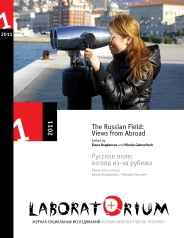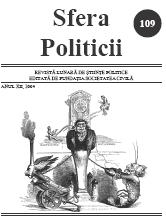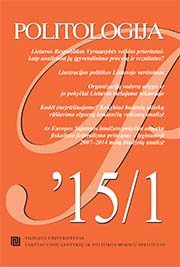
We kindly inform you that, as long as the subject affiliation of our 300.000+ articles is in progress, you might get unsufficient or no results on your third level or second level search. In this case, please broaden your search criteria.


The article introduces a new method for the empirical analysis of cultural phenomena, called multi-lectic anatomy. It is applied to two key culture-political “art actions” by Leningrad/Saint Petersburg artist Timur Novikov (1958–2002), who gained fame through a wide range of symbolic conceits, creating assumed satirical intentions, cynical denials, kynic hoaxes, and spoofs. The article models actual audiences’ differing judgments of Novikov’s performances. The case studies introduce the formal vocabulary of multi-lectic anatomy, expand Alexei Yurchak’s well-known discussion of stiob and the performative shift, and adapt the Russian concept of poshlost’ to discuss perceptions of moral and aesthetic bad faith. Many observers took delight in Novikov’s postmodern games and paradoxes. The article describes these as elaborate cultural expressions of a banal vacuum of values, and raises questions concerning the wider historical significance of Novikov’s supposedly dangerous artistic strategies.
More...
Interaction between civil society organizations and the state in Russia is analyzed on the basis of fieldwork in the Sortavala district in Karelia. The liberal and statist models wrongly assume that civil society and the state are distinct and opposing entities; this study shows that in practice they overlap and intersect. The often-made distinction between policy-advocacy and service-provision organizations is overly reductionist, since one organization can perform both functions. The cases discussed are a Municipal Social Service Center that bundles public and civic efforts; an independent child protection organization that actively collaborates with the authorities; and a network of women’s organizations that has successfully proposed regional policy initiatives. The article presents a case for studying state-civil society relations in Russia ethnographically and at the local and regional level.
More...

Interaction between civil society organizations and the state in Russia is analyzed on the basis of fieldwork in the Sortavala district in Karelia. The liberal and statist models wrongly assume that civil society and the state are distinct and opposing entities; this study shows that in practice they overlap and intersect. The often-made distinction between policy-advocacy and service-provision organizations is overly reductionist, since one organization can perform both functions. The cases discussed are a Municipal Social Service Center that bundles public and civic efforts; an independent child protection organization that actively collaborates with the authorities; and a network of women’s organizations that has successfully proposed regional policy initiatives. The article presents a case for studying state-civil society relations in Russia ethnographically and at the local and regional level.
More...
The article introduces a new method for the empirical analysis of cultural phenomena, called multi-lectic anatomy. It is applied to two key culture-political “art actions” by Leningrad/Saint Petersburg artist Timur Novikov (1958–2002), who gained fame through a wide range of symbolic conceits, creating assumed satirical intentions, cynical denials, kynic hoaxes, and spoofs. The article models actual audiences’ differing judgments of Novikov’s performances. The case studies introduce the formal vocabulary of multi-lectic anatomy, expand Alexei Yurchak’s well-known discussion of stiob and the performative shift, and adapt the Russian concept of poshlost’ to discuss perceptions of moral and aesthetic bad faith. Many observers took delight in Novikov’s postmodern games and paradoxes. The article describes these as elaborate cultural expressions of a banal vacuum of values, and raises questions concerning the wider historical significance of Novikov’s supposedly dangerous artistic strategies.
More...
Introduction to a thematic issue on ethnographic approaches to contemporary Russia by foreign researchers from a variety of fields. The issue is based on a conference held in Saint Petersburg in 2009, itself modeled after a similar conference in Germany ten years earlier. Integrating the foreign gaze into one’s own self-image is a straightforwardly useful exercise for social scientists from Germany and Western countries that have a history of colonial or hegemonic control over countries from the Global South. In Russia, whose self-image was shaped by foreign observers from the beginnings of academic study, the experiment is more complicated. Nevertheless, foreign ethnographers can contribute useful insights qua foreigners. However, Russia’s alterity, obvious to an older generation of Westerners visiting the Soviet Union, is no longer a matter of course for their younger colleagues with more transnational biographies.
More...

In June will be local elections and despite that a large majority of voters want a change there is no sign that Romanian politicians are able to produce an adequate offer. The political spectrum in not completely configure, the Social Democracy, the Liberalism and the Christian Democracy are not stabilized and clear defined. The Power is stacked in old fashion of doing politics and the Opposition has lack of professionals, logistics and ideas.
More...
Essey published by L. Patrascanu in "Era Noua" 02 March 1936, publication financed by the Comintern.
More...
For almost 15 years any rapport of the international organizations which appreciate Romania for the human rights respect, has been referring constantly to the restoration of the propreties of the religious cults. According to the author’s opinion it is a half way solved problem, because of the incomplete law frame and the lack of will in solving this situation at the local authorities level as well as the national level.
More...
The author transposes basic concepts of the economy like the demand and the offer into the religious zone, trying an evaluation of the “religious market”. Starting from the potential “customers”, from the polls that grant the church with a great deal of trust, the article analyzes the modalities to send the religious message and the new adapted to the last media means interface.
More...
The current US administration, dominated ideologically by the so-called neo-conservatives, engaged the only superpower into an adventurous and highly uncertain policy of unilateral military action, followed by a hopeless occupation of an important country in the Middle East. The hubris of neo-conservatives has proved to be a short-lived one, as the situation in Afghanistan and Iraq (and, generally, across the whole Middle East) is showing no sign of a clear out-of-mess strategy. As part of the “Coalition of the Willing”, Rumania is in a difficult position, especially in front of its “natural” (i.a.: European, mainly French and German) allies, and the political class has to take full responsibility for current and future difficulties coming from the perceived opportunism - and lack of a proper strategy, to take into account the national interest of Rumania – of several recent political gestures of the ruling politicians.
More...
The recent entry of Romania in the Security Council of ONU points out the problem of reforming this organization. Put in second place because of the interest of the Romanian society in Euro Atlantic integration, the ONU reform is analyzed under two aspects: the role of the organization as a leader in administrating the globalization and the evolution of the rapports between the unilateral and multilateral in global administration.
More...


Implementation of government commitments is one of the most relevant issues of public policy studies. A gap between electoral pledges, government priorities and their practical execution brought disappointment in many democratic countries and attracted significant attention from public policy researchers. This article elaborates a theoretical framework and sets several hypotheses for analysing the process of implementing performance priorities of the Lithuanian government and achieving their results. It argues that public policy decisions can be best explained by the interaction of advocacy coalitions in different policy subsystems. This process is affected by various external factors and events, which are usually an important but not sufficient condition for realising policy commitments. Within policy subsystems, it is necessary to assess beliefs, resources, and behavioural strategies of advocacy coalitions, coordination among different competing coalitions, leadership of policy change, performance management and policy learning during the implementation process. Also, in order to understand the execution of political priorities, it is important to take into account such important factors as the level of policy ambition and political attention throughout implementation. Moreover, any assessment of Lithuanian policy implementation should address such country-specific issues as fragmentation in the Lithuanian party system and competition between two blocs of political parties, the influence of the EU and Russia on the public policy process, and reform constraints imposed by decisions of the Lithuanian Constitutional Court. This theoretical approach will be employed for explaining the implementation of six major performance priorities of the Lithuanian Government 15 led by Prime Minister A. Kubilius: (1) preparations to build the Visaginas nuclear power plant; (2) higher education reform; (3) civil service reform; (4) restructuring the network of personal health care organisations; (5) structural reform of the social sector, and (6) execution of the housing renovation programme. A public policy research agenda focused on the analysis of government commitments can be also applied to assessing how specific political priorities or other policy decisions are carried out in Lithuania and other democratic states, as well as to explaining successes and failures of their implementation process. Causal process tracing can be employed for the within-case and between-case analysis of policy studies. Theoretically developed and empirically rich policy studies following this research agenda would provide interesting insights on policy implementation to researchers, politicians, civil servants, various policy stakeholders, and even citizens.
More...
The article deals with contemporary executive’s rewards system in the Lithuanian public sector and its changes over time. This analysis includes high officials in civil service as well as heads of public service’s providers and managers of state-owned enterprises. The analysis bases on the reward dimension of the Public Service Bargains (PSBs) model which reflects different approaches to tangible and intangible reward elements. This theoretical approach is used to test the hypotheses that there is a clear public sector bargain on the executive’s rewards system, and this bargain was shaped by pre-planned reforms in the public sector. The analysis of the legal framework of the tangible reward system explains how egalitarian bargain was consolidated in the fragmented public service system, and pre-planned reforms added some hierarchical and individualistic elements to this system. The assessment of the Lithuanian public sector executives’ tangible rewards in the international context, differentiation among different types of Lithuanian public sector organizations and inside organisations itself provides clear evidences that the egalitarian reward type dominates in the Lithuanian public service. The refusal by politicians to align the reward system periodically with changes in economic conditions during growth times also strengthens this egalitarian element. Recent public deliberations allow to assess how divergent are approaches by politicians and high public officials to the contemporary executive’s reward system. On the one side, there is a broad political coalition which in a consistent way supports the egalitarian approach to the executive’s reward system. On the other side, high civil service officials follow the logic of the hierarchical system and use judicial measures to protect their interests. An overview of the intangible reward elements in the Lithuanian public sector also shows supporting evidence to the egalitarian reward system. In this context, notable is the failure to introduce a clear career path as the key element of the hierarchical system. This article concludes that the Lithuanian public sector executive reward system can be regarded as egalitarian and was largely shaped by incremental policy decisions, changes in economic conditions, and court decisions but not by pre-planned reforms.
More...
In comparative studies of transitional justice in post-communist Central and Eastern Europe, Lithuania is ranked among the countries which have taken the strictest lustration measures. In contrast, a very negative perception of the issue dominates the Lithuanian public discourse. Lustration is often described as impotent or failed in the media. Despite its high political importance, there has been no systemic analysis evaluating the results of Lithuania’s lustration policy (LLP). This article aims at analyzing the effectiveness of LLP. The effectiveness is defined through achieving the official goals set by the policy-makers, which leads to the main research question: has the lustration policy in Lithuania achieved its goals? The main object of this article is the LLP which consists of three sets of laws: 1998 laws aimed at restricting the former KGB employees, 1999 law aimed at KGB’s secret collaborators, and 2010 law allowing publishing remaining KGB documents. Analysis is primarily based on semi-structured interviews with the key officials, who formed and implemented Lithuania’s lustration policy. Besides, the content analysis of press coverage, legislative acts, and transcripts of Parliamentary sessions were employed. LLP was expected to achieve three main objectives: (1) to ensure state security by banning supposedly disloyal persons from strategically important institutions; (2) to ensure state security by protecting former secret collaborators from blackmailing and manipulation by foreign secret services; (3) to inform the society about the system and practices of the former KGB. While analyzing these goals, two aspects were taken into consideration: (a) whether the legislation has created favorable conditions for their implementation; (b) whether the expected results were achieved by implementing the lustration measures. The first goal was achieved only partly. Although the former KGB employees were successfully banned from selected positions for the following ten years, the secret collaborators were mostly unaffected by the law. Moreover, one group formerly associated with KGB – the reserve officers – was not included in the legislation and therefore was not affected by the LLP. Ensuring protection from blackmailing was aimed at the former secret collaborators only, because many of their files were missing and accessible to either the government of the Russian Federation or private persons. This goal has been achieved rather effectively. More than 1500 people confessed having collaborated with the KGB. Their identities were classified ensuring their protection in case of blackmailing. As a result, the use of the entire former KGB network was impeded, because the identities of those, who confessed, were concealed and the risks associated with contacting former collaborators were significantly enhanced. The last goal – to inform society – was achieved as well, although its implementation was overdue and slow.
More...
The fiscal federalism theory was developed to explain budget formation in independent states. At present, this theory is often applied to supranational institutions like the European Union (hereinafter EU), without paying enough attention to the unique characteristics of this level of analysis. This article identifies which assumptions of the classical fiscal federalism theory cannot be applied to the supranational level. After modifying these assumptions and adding the public choice theory and political economy insights, the fiscal federalism theory is applied to describe the EU budget. This paper answers the question of whether changes in the EU budget of 2014 were in line with the normative principles of the fiscal federalism. It was found that changes in the EU budget fwere not systematic: while we can see the progress in the implementation of the principles of fiscal federalism in some policy fields, regression and the lack of positive changes are observed in others. Recommendations to the policy makers how the EU budget could be improved are presented in the conclusions. This paper presents a comparative analysis of the policy fields from two multiannual financial frameworks (2007–2013 and 2014–2020 years). It assesses the evolution of the financing (increase, decrease, no change) and the structure of the seven policy areas. The budget of the fiscal year 2007 is considered as the reference point. Financing the analyzed policy fields makes up 80% of the EU budget. The ECORYS Report (ECORYS Nederland BV, 2008) has already given a comprehensive analysis of the 2007 fiscal year budget in accordance to its compliance with the principles of fiscal federalism. The report also discusses the recommended quantitative changes in future budgets. This article evaluates not only the quantitative but also qualitative changes in the EU budgets throughout the period 2007–2014. The agreement about the new multiannual financial framework had to be made under more unfavorable conditions than the last framework. Negotiations involved more than ever players, players’ preferences were very different, the decisionmaking rules were amended – a new institutional authority was added (European Parliament), Euroscepticism significantly increased, finally, some goals of the Europe 2020 are inconsistent with the fiscal federalism principles. Perhaps because of these circumstances, progress in reforming the EU budget in accordance with the principles of fiscal federalism has not happened. Amongst the seven policy fields, positive changes were recorded in four, negative – in two, more negative than positive – in one policy field. Despite the fact that there were positive developments in the vast majority of policy fields, the financing of these fields makes up only ~38.9% of the EU budget. Meanwhile, funding for the remaining three areas consists of ~40.6% of the EU budget (2014 EU budget -142641 million euros).
More...